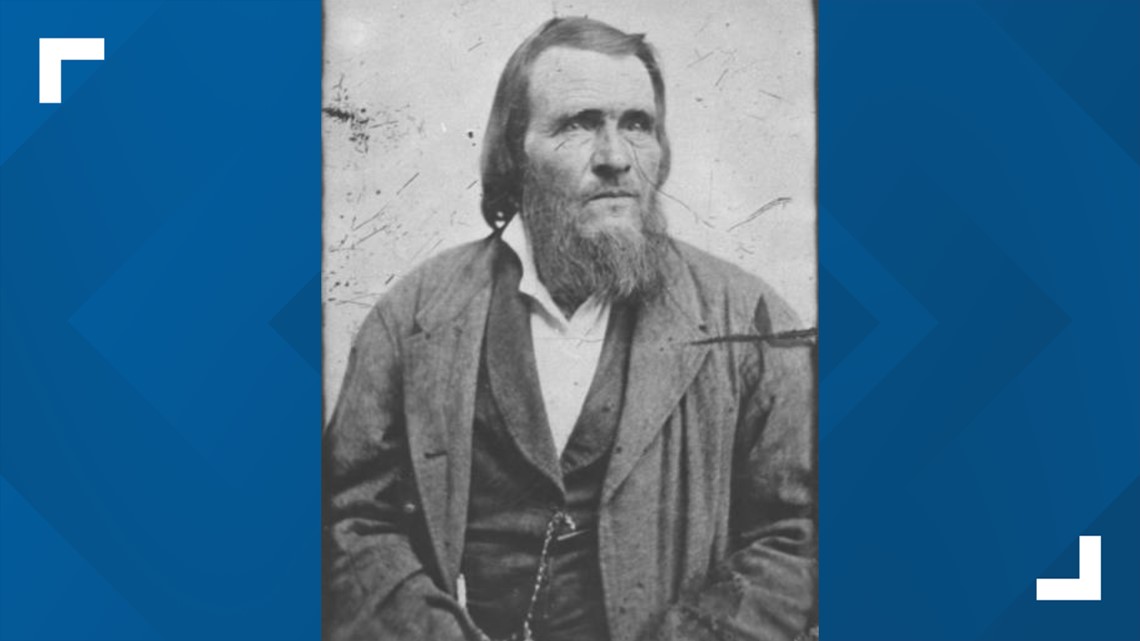Bethel Primitive Baptist Church, in the Nashville, Tenn. area (see here), is pastored by Ronald Lawrence. I knew Ronald, having met him in the late 70s. He was an elder in the Little River Association of North Carolina, an association I visited back then.
Father and I visited Bethel back in the 70s when it was pastored by Elder Vern Jackson who I well remember. Father spoke there on appointment and I was asked to "introduce" the service. I spoke about 10 minutes speaking on Psalm 34:1 and the words "I will bless the LORD at all times: his praise shall continually be in my mouth." I also remember the private talks that father had with brother Jackson about doctrinal issues. During that trip to middle Tennessee we also visited several other churches in the Nashville area. I spent a lot of time in middle Tennessee when I was a young Hardshell minister.
I spent much time with Milton Lillard, pastor of many of the churches in that area (and Franklin and Murfreesboro), some which were once pastored by that famous elder Dr. John M. Watson, author of "The Old Baptist Test."
It is also where Dr. and Elder R.W. Fain labored for many years, editing Watson's book and writing the introduction, publishing two periodicals, the "Herald of Truth" and the "Baptist Watchman" with fellow minister and doctor, J. B. Stephens.
This is one of the largest churches among the non progressive faction of the Pbs. Their building is a rather large and expensively built one. You can see the picture of it on their web page.
In this posting I want to review a few things said on this church's web page. In the section "About Primitive Baptists" we read (emphasis mine):
"The name “Primitive” was first used in the early 1830’s when a major division came in the Baptist family. One group advocated a general atonement with salvation by the work of Christ, plus belief of the gospel by the sinner. They came to be known as “New School” or “Missionary Baptists”. The other group continued holding steadfastly to the doctrine of “Particular Redemption” with salvation entirely by the grace of God through the shed blood of Jesus Christ. They came to be known as “Old School” or “Primitive Baptists”. Therefore, the word “Primitive” denotes the desire to maintain the identity of the Lord’s church as he established it and gave it to his disciples." (here)
There is so much falsehood in these words that it requires a least a few words. First, the division was not over the question of the extent of the atonement! Second, it certainly was not about means or whether belief of the gospel was necessary for final salvation! Concerning the former, elder J. H. Grime in his "History of Middle Tennessee Baptists" said this about the division in Middle Tennessee:
"In this fight there
was no doctrinal contention, as both parties stood
firmly fixed on Calvinistic principles." (pg. 11, see here)
Grime had shown that those who believed in general atonement nearly all left in the Campbellite division in 1827, so the later Hardshell division was not over that issue. He writes:
"Prosperity attended the above minority, and in 1834
they had fairly recovered from the shock of 1827; but
it was not for them to enjoy this state of peace longer.
This time, however, it was not a doctrinal difference
which disturbed their peace, but that of methods practiced." (ibid)
This is what Brother Bob L. Ross and I have said (along with others before us). The split with the "Missionaries" was over methods of evangelism and church autonomy and not over doctrine.
Further, if one reads the "Black Rock Address" he will see no mention of the atonement question and he will see no declaration against the use of means in the new birth or salvation. (See my posting about the Black Rock Address in the posting "Montgomery on "Time Salvation" - here) In that Address the authors of the document believed that the elect are "chosen to salvation through sanctification of the Spirit and belief of the truth." In fact, if Lawrence and his brethren at Bethel church will read the early periodicals, such as "The Primitive Baptist" out of North Carolina, they will see how the above passage is often cited to show that belief of the gospel was a part of that salvation to which sinners had been chosen.
In closing let me say a few things about some of their other articles. First, under "Purpose of the Church" they say:
"The Church was established by Christ (Matthew 16:18) to be a home (on earth) away from home (Heaven) for God’s children. It is a refuge or sanctuary where one may receive spiritual comfort, rest and peace, and instruction in righteousness. The church was also established to give glory to God by Christ Jesus throughout all ages, world without end. (Ephesians 3:21)"
How misguided! Do you see any reference to the kinds of labors or works in which the church should be involved, in this statement? Yes, they mention "giving glory" and "receiving," but where is the work? Is there not labor in the vineyard for the saints as a body? Paul wrote to the church at Corinth and said:
"Therefore, my beloved brothers, be steadfast, immovable, always abounding in the work of the Lord, knowing that in the Lord your labor is not in vain."
Next the statement of faith says:
"Purpose of the Gospel" - "The gospel was never designed to bring eternal life to anyone. It means nothing to the dead sinner, but is good news and glad tidings to the born-again child of God who feels to be poor and needy and unworthy of God’s mercy and grace, to hear that Jesus paid the sin debt, saved him from his sins and now he is preserved in Christ. (Isaiah 40:1 & 9, Isaiah 52:7, Ephesians 4:11-12, 2nd Timothy 1:9-10, John 21:15-17, Acts 20:28, 1st Peter 5:1-3)"
This is not biblical and it is not the historic view of our Baptist forefathers! The founding fathers of the Pb denomination would not accept that view! There are so many scriptures that completely overthrow this statement.
Under "Basic Difference Between Primitive Baptists and Other Religious Groups" the statement says:
"The main difference may be summarized by a look at the subject of cause and effect. What others say is the cause of salvation (such as belief, faith, repentance, baptism or other acts by an individual), Primitive Baptists believe these acts are the effects of, or evidence of, spiritual life and can only be performed sincerely by those already in possession of eternal life. In other words, salvation is totally by God’s grace."
What a misrepresentation! Is belief and repentance an immediate effect of God's causation? Cannot God use an instrument in his causation? If belief and repentance are effects of God's work in rebirth, will they not be universal in all upon whom God does this work? Is not faith a result of God's grace? Is conversion by the gospel not by God's grace? If God uses an instrument in his work, it then ceases to be his gracious work?
What about calling men to salvation, or evangelism? Why is there no mention of that glorious work? Does not "the bride" say, along with the Spirit, to all sinners, "come and take the water of life freely"? (Rev. 22: 17) Does the body of believers, acting together as a church, "hold forth the word of life" to sinners? (Phl. 2: 16)
Next the statement says under "Regeneration, New Birth, Being Born Again:
"These different terms define what happens when God quickens one of his children into eternal life. We believe this is done by the life-giving voice of Jesus Christ and is always effectual and irresistible on the part of the individual. This is done separate and apart from the preaching of the gospel and without any aid of man. (John 3:6-8, John 5:25, John 6:37, Romans 8:30, Ephesians 2:1, 2nd Timothy 1:9)"
Again, this is simply contrary to the express teachings of scripture. None of the scriptures cited say what the statement says! The "life giving voice" of the Lord is heard in the preaching! People don't hear Jesus speaking to them when Elder Lawrence preaches? Good God, please help them!
Elder Hosea Preslar, who lived in middle Tennessee with Watson (before moving back to NC in the bounds of the Bear Creek Association), wrote this about the Two Seed view of "anti means."
"But some object (the "ultraist" Hardshells - SG) to these ideas and say all this is the work of the spirit of God; and the gospel has nothing to do with it. Ah, a gospel without a spirit! Well, God save me from a gospel that has not His spirit. God says His word is quick and powerful, and He says by Peter, This is the word which by the gospel is preached unto you; I Peter 1: 25. And as to the subjects of Gospel address, it is to every creature the disciples were commanded to preach the gospel; and Paul said, Whom we preach warning every man, and teaching every man, in all wisdom, etc.; Col. 1: 28. So we see that their idea on that point is false as the balance, and we will now give their last, but not least error a passing notice." (see
here)
In enumerating the errors of the Two Seeders, Preslar listed this as one of them:
Sixthly: That the gospel never was designed for anything else, but for the edification of the body of Christ, and that believers are the only subjects of gospel address.
(See here)
Next, the Bethel statement says:
"Practice of the Church" - "The worship service is patterned after the New Testament example and authority which consists of congregational singing, prayer and preaching. Musical instruments are not used in the services because there is no New Testament command or example for them. Even though musical instruments were in existence during the time that Christ established his church, there is no record of their use in the worship services. We do believe in singing and making melody in the heart to the Lord. (Ephesians 5:19, Colossians 3:16)"
Patternism! The thing that characterizes both the Campbellites and Hardshells! Also, there are just several things wrong in what is said about musical instruments, which we have shown many times before. Where are church associations in the bible? Where is radio preaching? Etc.
Next, the statement says:
"Also, there are no Sunday Schools for lack of New Testament authority. Their beginning was not until the 18th century in England, and then was only to teach reading, writing and arithmetic to underprivileged children. However, this does not mean in any way that Primitive Baptists do not believe in teaching children. The scriptures teach that parents are to teach their children at home privately (Ephesians 6:4), and then under the sound of a gospel minister in the public assembly."
Again, so many errors in these words! Teaching the bible to people in classes has "lack of New Testament authority"? Are you kidding me? Further, the Baptists have always been involved in teaching children by the use of catechisms, as I have shown before.
Finally the statement closes with these words:
"We would encourage the reader of this pamphlet to search the scriptures as the Bereans (Acts 17:11) to see if these things are so."
Really? Well, we do that very thing in this blog!


